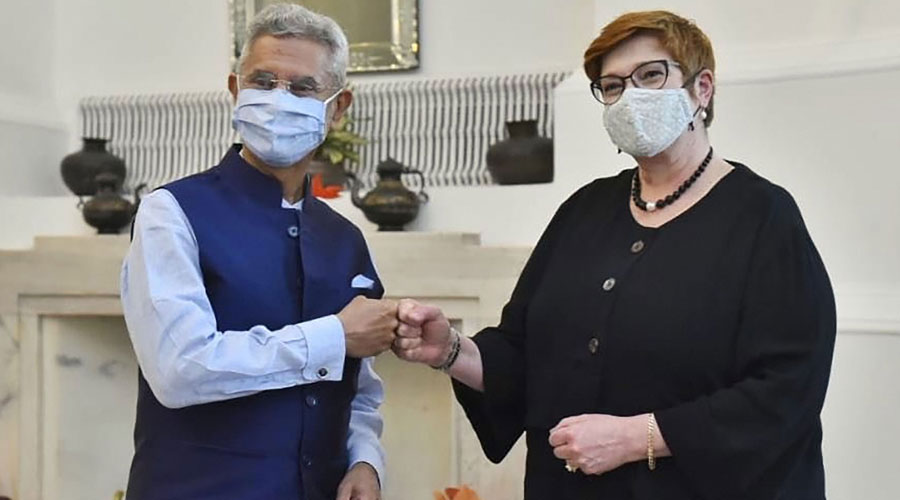India and Australia on Saturday asserted that Afghanistan must not allow its soil to be used in any manner for terrorism and it should never again become a safe haven for "breeding and training" of terrorists, as the two countries held a detailed discussion on the situation in the war-torn country after its takeover by the Taliban.
At the inaugural India-Australia two-plus-two dialogue, the foreign and defence ministers of the two countries also vowed to work towards a free, open and inclusive Indo-Pacific, a region that has been witnessing increasing Chinese assertiveness.
With the dialogue coinciding with the 20th anniversary of the 9/11 terror attacks that led to the US invasion of Afghanistan in 2001, both sides strongly called for combating terrorism without any compromise.
External Affairs Minister S Jaishankar and Defence Minister Rajath Singh held extensive in-person talks with their Australian counterparts Marise Payne and Peter Dutton.
Noting that Afghanistan was a "major subject of discussion", Jaishankar said,"we had a very detailed exchange of views and our approach is very similar in a way it is summed up by the UN Security Council Resolution 2593 which emphasises most of all that Afghanistan must not allow its soil to be used in any manner by anybody for terrorism."
Addressing a joint media briefing along with other ministers, the external affairs minister said there were also concerns relating to the composition of the interim Taliban cabinet as well as about the treatment of women and minorities.
"But apart from that (terrorism), there were issues of concerns about the inclusiveness of the dispensation, concerns about the treatment of women and minorities, matters related to travel of Afghans, issues relating to humanitarian assistance. It is an evolving situation and it was a good exchange of notes," he said.
Jaishankar said both sides agreed that the international community must be united in its approach, guided by UNSC Resolution 2593.
The UNSC resolution, adopted on August 30 under India's presidency of the global body, demanded that Afghan territory should not be used to threaten or attack any country or to shelter and train terrorists and plan or finance terrorist attacks.
"Today is the 20th anniversary of 9/11. It is a reminder- if one is still needed- of the importance of combating terrorism without compromise," he said.
"Close as we are to its epicentre, let us appreciate the value of international cooperation," he said, apparently referring to Pakistan with India often describing it as the "epicentre" of terrorism. However, he did not mention any country by name.
On her part, Payne said Australia shares a very strong interest in ensuring that Afghanistan never again becomes a "safe haven for breeding or training of terrorists", noting that it is an abiding concern of the international community.
"Along with the ongoing fight of terrorism, the future of Afghanistan remains a central concern to both of us," she said.
"Both of our countries have been victims of appaling terrorist attacks and this day, the 11th of September will be forever remembered for those terrible events 20 years ago when terrorism struck at the heart of our friend the United States, and by extension also a modern pluralist and democratic world," Payne said.
"It is fitting that minister Dutton and I should be here on this anniversary with such an important democratic partner," she added.
About the situation in Afghanistan, Payne said Australia is very much focused on seeking safe passage for Afghan citizens, foreign nationals and visa holders of other nations who want to leave that country.
"We have urged that they be allowed to leave safely. We are very conscious about the impact of violence and breaches of human rights of the Afghan community and would call for fundamental human rights to be observed," she said.
During the talks, the two sides also deliberated on the situation in the Indo-Pacific, South China Sea, ways to further deepen bilateral defence and trade cooperation and to effectively deal with the challenges of coronavirus pandemic.
Jaishankar said the 'two-plus-two' dialogue reflected the comfort that India and Australia have attained in the bilateral relationship, especially in strategic and security spheres, based on the growing convergence based on a shared commitment for a free, open, prosperous and rules-based Indo-Pacific region.
"The peaceful development of the Indo-Pacific region has been a focus of our relationship. Our two countries believe that it should be shaped in a participative and collaborative manner," he said.
Jaishankar said both sides reiterated their commitment to continue to work together for peace, stability and prosperity of all countries in the region.
"This would include a rules-based international order, freedom of navigation in international waters, promoting connectivity as well as respecting territorial integrity and sovereignty of all states," he said.
Jaishankar said the importance of ongoing cooperation in the multilateral arena for preserving the rules-based international order was also emphasised.
In his comments, Singh said both sides discussed various institutional frameworks for wide-ranging collaboration including defence cooperation and the fight against the global pandemic.
"During the discussions, both sides emphasised the need to ensure free flow of trade, adherence to international rules and norms and sustainable economic growth in the entire region," he said.
"On the bilateral defence cooperation we decided to expand military engagements across services, facilitate greater defence information sharing and to work closely for mutual logistic support," he said.
 Wednesday, 22 January 2025
Wednesday, 22 January 2025









